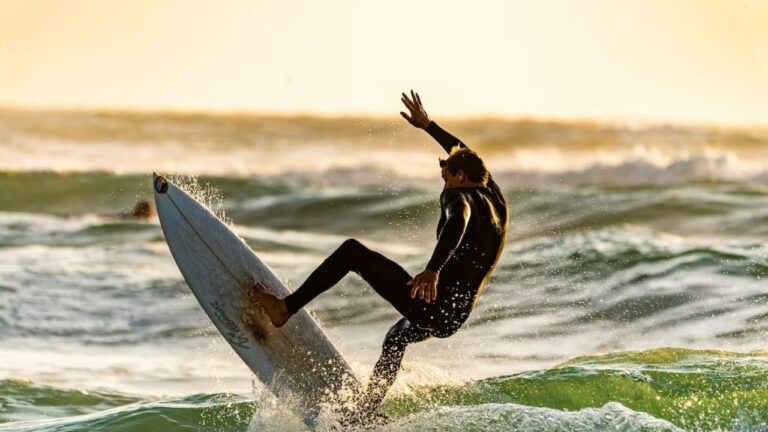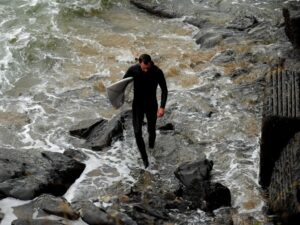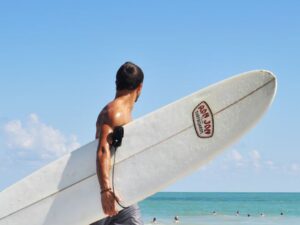It’s common for beginners and even intermediate riders to feel exhausted after a surf session.
Surfing can tire you because it’s an intense physical activity requiring much energy and focus. The challenging combination of paddling, balancing, and riding breaks can quickly sap your strength if you’re not experienced enough to maneuver your way.
Looking from the outside, riding the waves may seem like child’s play. All you have to do is fight the waves while holding onto the board, right? Nope.
A breaking wave can apply an approximate pressure of 250-6,000 pounds per square foot, depending on its height. This means fighting the waves is impractical and inefficient.
The first thing y’all must do as beginners is to change your outlook. It’ll soon come from experience, but you must TRY to relax for now.
Like biking, you’ll get tired and fall if you’re too stiff in the ocean. In surfing, we don’t fight the waves. We ride them and enjoy them instead.
Don’t think all I’m gonna do is tell you to relax. I have a lot of tips from my experience. Let’s get started!
Why is surfing so tiring?
Surfing engages multiple muscle groups, increases heart rate, and demands constant attention, all of which can drain your energy and leave you exhausted. Additionally, sun exposure, dehydration, and the intensity of the ocean can further tire you out.
Generally, there are six main reasons why surfing is so tiring: cardiovascular exercise and poor breath control, muscular and mental fatigue, exposure to sun and ocean water, beginner’s fatigue, and lack of recovery.
1. Cardiovascular Exercise & Poor Breath Control
You need a lot of energy to paddle out to the waves, catch them, and ride them back to shore. The constant movement and resistance from the water make it the perfect HIT workout, which can often exhaust you.
In fact, surfing is an excellent cardiovascular exercise that helps burn belly fat.
And like any other cardio-heavy exercise, riders must learn to control their breathing. Diving underwater, paddling the board, trying to catch waves, and wiping out requires you to efficiently catch your breath.
But you will tire quickly if you’re frequently out of breath in the ocean.
2. Muscular Fatigue
Surfing engages a wide range of muscles, from your legs and core to your arms and back.
Paddling out to the waves and riding them back to shore requires a lot of effort, which can lead to muscular fatigue.
Moreover, the surfing conditions are entirely dependent on the weather and environment. You can’t slow down once you’re out there, even if there’s a storm.
And if you get wiped out, you may have to spend all your energy just to return to safety. For beginners, wipeouts commonly lead you to spend much of your energy.

3. Mental Fatigue
You must know your surroundings, read the waves, and make quick decisions. This mental fatigue can be just as exhausting as physical exertion.
Additionally, fear and anxiety can further exhaust you by piling onto your existing stress.
If you remember what I explained earlier, being afraid and anxious can make you stiff on the waves, adding to your physical exhaustion.
4. Exposure to Sun and Water
Spending several hours in the sun and water also contributes to feeling tired. Exposure to the sun leads to dehydration, while water can sap your energy.
Moreover, the cold water is especially draining because your body has to work harder to maintain its core temperature.
5. Beginner’s Fatigue
It makes sense. When you’re just a beginner, your body and mind aren’t used to the toll surfing puts on you. So you get tired quicker than you would with a couple years of experience.
But don’t worry, it gets better with practice. Soon, your mind will do away with the fear and anxiety. And your muscles will be toned to help you surf efficiently.
Till then, don’t be afraid of wiping out. If you didn’t know, a wipeout means when you fall off your surfboard. In the beginning, you’ll wipe out more often than you’ll catch a wave. However, it’s part of your learning curve.
So, keep practicing!
6. Lack of Rest and Recovery
Finally, the biggest mistake we all make as beginners is overenthusiasm.
If you’re surfing every day without giving your body a chance to recover, you’re more likely to feel exhausted.
You must always listen to your body and rest when it’s due.
How to not get tired while surfing?
Over time, your body will build muscles to combat water resistance. It’ll feed some movements into the muscle memory to help you perform techniques quicker than ever before. And you’ll not be a beginner anymore.
But what about now? How can you mitigate exhaustion and recover quicker as a beginner?
1. Warm-up and Cool-down Before and After Surfing
Before you hit the waves, it is essential to warm up your body properly. Warming up can help prevent injury, improve your performance, and increase your endurance.
It’s also an excellent way to prepare your mind and body for the activity ahead. Some simple warm-up exercises that you can do before surfing include jogging, jumping jacks, lunges, and stretching.
Focus on stretching the muscles in your shoulders, back, hips, and legs. A good warm-up should last 10-15 minutes.
2. Pace Yourself During Surfing
One of the most common reasons why surfers get tired is that they try to catch too many waves too quickly. This can cause your muscles to fatigue faster, leading to a shorter session.
To prevent this, you should pace yourself during your surfing session. Try to catch only some waves that come your way. Instead, focus on catching the waves ideal for your skill and energy levels. Take breaks in between sets to give your muscles a chance to recover.

3. Staying Hydrated and Properly Fueled During Surfing
You must drink plenty of water before, during, and after your session. Dehydration can cause fatigue, muscle cramps, and headaches, making it difficult to continue surfing.
Additionally, you need a balanced meal before your session. It’ll provide your body with the necessary nutrients to fuel your muscles. During your session, you can snack on energy bars, fruit, or nuts to keep your energy levels up.
4. Technique
Hone your craft and practice as much as you can. Advanced surfers don’t perform 360 spins on Day 1. It takes time and practice.
You can maintain your stamina and surf longer without getting tired using proper technique.
Surfing is a fun and exciting sport that can give you an incredible workout. However, you must care for your body to prevent fatigue and injuries.
And trust me, it’s much more fun when you can surf longer without feeling drained.
How do you recover faster after surfing?
For post-surfing recovery, you should rest and replenish your body with nutrients. Hydrate with water or a sports drink, and eat a balanced meal with protein and carbohydrates to help repair and refuel your muscles. Stretching and foam rolling can also help alleviate muscle soreness and stiffness.
Generally, some people recover quickly (within a few hours), while others may take a day or two to recover fully. The time it takes to recover after surfing depends on various factors, such as your fitness level, session intensity, and diet.
1. Stretching & Cool-Down Exercises
Our muscles are constantly working when we’re surfing. This makes them tight and stiff. That’s why ending your surf session with a cool-down routine is important to restore flexibility and range of motion. It also helps prevent injury, so a win-win situation.
Some good stretches in your cool-down routine include hamstring, quad, and shoulder stretches.

2. Proper Nutrition and Hydration
Your body needs the right nutrients to repair and rebuild muscle tissue, and it needs to be properly hydrated to function at its best.
After surfing, drink plenty of water and replenish your electrolytes. You should also eat a balanced meal with lean protein, complex carbohydrates, and healthy fats.
Some good post-surf foods include grilled chicken with brown rice and vegetables, a quinoa salad with avocado and chickpeas, or a spinach, banana, and almond butter smoothie.
3. Rest and Sleep
Aim to get at least 7-8 hours of sleep per night, and consider taking a nap during the day if you’re feeling particularly tired.
You should also give yourself a break between surf sessions to allow your body to fully recover before you hit the waves again.
4. Massage and Foam Rolling (Optional)
It’s one of the most effective methods for promoting muscle recovery. These techniques help increase blood flow to the muscles, speeding up recovery and reducing muscle soreness.
Foam rolling is a self-massage technique that uses a foam roller to apply pressure to tight or sore muscles. Using a foam roller, you can target specific body areas and apply varying pressure levels to release tension and promote relaxation.
5. Hot-Cold Therapy (Ice-Heat Therapy)
Another option is to opt for ice or heat therapy. Ice can reduce inflammation and numb pain, while heat can help increase blood flow and promote relaxation.
Depending on the soreness or injury type, ice or heat may be more effective. For example, ice may be better for experiencing acute pain or swelling. Heat therapy may be more effective when dealing with chronic muscle soreness.
6. Yoga
Yoga is a great option for promoting flexibility and relaxation. Swimming can also provide a low-impact exercise that promotes blood flow and reduces muscle soreness.
Is feeling tired after surfing normal?
Feeling tired after a surfing session is normal, especially if you are new to the sport or riding in challenging conditions. Your body is working hard to maintain balance and navigate through the water, which can be physically demanding.





